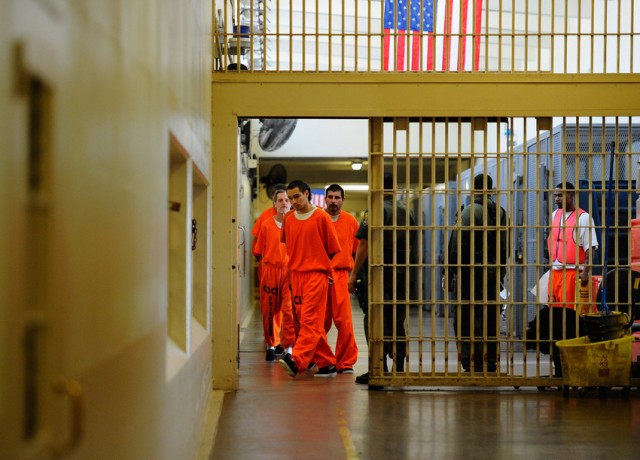And here's part of the Twitter reportage from our old Sacramento guy, John Myers:
Here's the first Associated Press dispatch on the story:
SACRAMENTO — Gov. Jerry Brown and the four leaders of California's Legislature reached a compromise Monday on reducing the state's prison population, offering to spend more money on rehabilitation efforts if a panel of federal judges will extend an end-of-the-year deadline to release thousands of inmates.
The deal relies on the state persuading three federal judges to give California time to let rehabilitation programs work rather than spend $315 million to lease cells in private prisons and county jails.
The leaders agreed that if the judges don't extend the deadline, the state will fall back on Brown's plan to lease the cells.
"There's insurance here against early release" of prisoners, Senate President Pro Tem Darrell Steinberg, D-Sacramento, said at a news conference outside the governor's office, where he was joined by the governor and Democratic and Republican leaders of each chamber.
Steinberg had opposed Brown's plan and wanted to ask the judges to delay the deadline for three years while the state gave counties $200 million annually for drug, mental health and other rehabilitation programs.
The agreement reached Monday resolves the impasse as lawmakers race toward the end of the legislative session this week.
However, there is no guarantee the judges will go along.
The three-judge panel ordered the state to lower its prison population by about 9,600 inmates by year's end. Brown is appealing that decision to the U.S. Supreme Court, but the justices recently declined to delay the deadline set by the lower court.
Without an alternative, the judges have threatened to order the state to give thousands of inmates good time credits, which would lead to their early release. They have repeatedly threatened to hold Brown in contempt if the state does not meet the deadline to reduce the prison population to about 110,000 inmates.
The bill to be considered this week includes Brown's original plan to lease cells if the judges stick to the year-end deadline. If they grant an extension of time, a portion of the money that would have been spent to rent cells would instead go to rehabilitation programs.
Brown has argued that the state already reduced the population by 46,000 inmates to comply with court orders, primarily through a 2-year-old law that sentences lower level offenders to county jails instead of state prisons. He argues that only the most dangerous convicts remain in state prisons.
"That's huge, that's monumental. We can build on that, but not in a month or a year," Brown said Monday about previous inmate reductions.
Steinberg had orchestrated opposition from Senate Democrats to Brown's plan and wanted the administration to negotiate with attorneys who represent inmates to push back the year-end deadline by three years. Brown rejected those talks, saying he would not let inmates' attorneys help determine the state's public safety policy.
The resulting compromise includes no new proposed deadline for the state to meet the court-ordered population level if an extension is granted, nor does it promise benchmarks or guarantees that the state would comply if granted more time, said Prison Law Office director Don Specter.
"We don't believe it's sufficient to meet the court's order or even get a reasonable extension of time," said Specter, whose firm is among those that sued to force the state to reduce prison crowding to improve conditions. "It's not specific enough, it's not certain enough."
Brown said he did not know what the three judges would do about the deadline.
However, Brown and Steinberg said they had been seeing "smoke-signals" that the judges were willing to consider the state's proposal.
J. Clark Kelso, appointed by the federal courts to oversee prison medical care, has been meeting with legislative and administrative officials in recent days. He and his spokeswoman declined comment.
